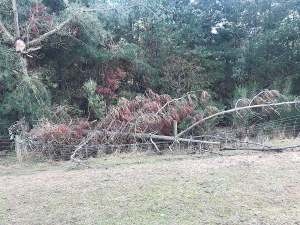The local golf club was packed for the meeting, late last month.
At issue is the number of forestry blocks in the district which farmers say are bad neighbours, harbouring feral pigs and other pests.
Sheep and beef farmer Jim Crawford, whose farm is bounded on three sides by three different forest owners, said feral pigs can break a hole in even a good fence, while forest debris can also damage the fences.
Pigs then get in and root up pasture, and hunters trying to cull them are forbidden to follow them back onto forestry land, said Crawford.
"They've got to call the dogs back. Then my gripe is, they only come back the next night.
"That's what really gets up my nose. They [forestry companies] are opting out of their responsibilities for what's really going on.
"All these years, I've been fixing fences when their trees are falling over."
But Crawford singled out one company, Port Blakely, for making contact after the meeting.
"They were very understanding and were very good to deal with, which I appreciate."
Wenita Forest Products CEO Dave Cormack, who spoke at the meeting, said the main problem was a lack of communication.
"We just need to understand each other a little bit better and communicate with each other a little better because the forest owners can't fix problems that they don't know about."
Cormack said that for many farmers having trees next to their properties was a new situation so they don't understand all the things that are reported to forest owners.
Rayonier Matariki Forests regional manager Hamish Fitzgerald told the meeting that Rayonier had culled 2,000 possums, more than 1,000 pigs, 150 deer and 100 goats from just one of their blocks.
Cormack said Wenita encouraged recreatinal hunters but only if they have a permit. The company had a health and safety responsibility to their workers not to allow random access.
Federated Farmers Otago president Luke Kane, who also attended the Lawrence meeting, said there was a lot of new forestry in the district and populations of pests, especially pigs, had ballooned.
'Costing Us A Fortune'
Out-of-control populations of goats, pigs, deer and other wild animals are costing farmers "an absolute fortune" and taking a significant toll on indigenous biodiversity, says Federated Farmers pest management spokesperson Richard McIntyre.
"This ia a very serious problem that's costing Kiwi farmers almost a quarter of a billion dollars every year. These pests aren't just chewing into farmers' bottom lines; they're also chewing into our native bush and completely undermining conservation efforts," McIntyre said.
His comments came in a press release coincidentally published a couple of days after the Lawrence meeting - although it pointed the finger more at the Department of Conservation than at Forestry.
McIntyre told Rural News that Farming and Forestry can be good neighbours, but forest owners need to control their pests.
They tend to control pests when their trees are vulnerable during the establishment phase but not once there is no economic benefit to it, he said.
A recent survey of more than 700 Federated Farmers members across the country showed feral animals were costing them at least $213 million a year.
That figure includes a direct spend of $5.45 per hectare on pest control ($74 million per year) and $10.22 per hectare in lost production ($139 million per year).
"That is a huge cost for rural communities to be carrying at a time when many farming families are already struggling to turn a profit," McIntyre said.
"It's also a very conservative estimate and doesn't include things such as the cost of restoring damaged pasture, fixing broken fences or the loss of trees."
McIntyre said things were particularly bad on farms bordering DoC land.

















